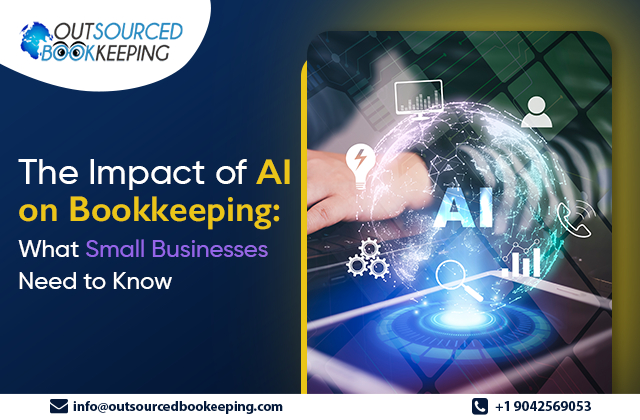Artificial Intelligence (AI) is changing all sectors of business, and bookkeeping is not an exception. For small business owners, the adoption of AI on bookkeeping is a great opportunity to work smarter, faster, and more accurately. Since more and more companies now choose AI bookkeeping services, it is necessary to determine its function and advantages. In this blog, we will talk about how small business bookkeeping with AI works and what this means for bookkeeping.

What is AI Doing to Bookkeeping?
Automating Repetitive Tasks
Repetitive tasks, such as data entry, invoicing, and bank reconciliation, are where AI solutions are particularly useful. These activities typically take a long time and carry a high risk of human error. Therefore, outsourced bookkeeping with AI enables business owners to focus on more important and prospective activities, while being confident that everything is handled accurately.
Improving Accuracy
Bookkeeping mistakes can prove to be costly in the long run. Moreover, these mistakes often occur due to manual errors. However, AI-driven systems significantly reduce these risks because the algorithms used are highly accurate in processing data. As a result, artificial intelligence in small business accounting ensures that all accounts are consistently correct and that there are no compliance or fraud issues.
Providing Real-Time Insights
Another key advantage of AI in accounting is its ability to provide real-time information. AI tools can process financial data instantaneously, providing businesses with up-to-date insights on cash flow, expenses, and profitability. Consequently, these insights enable small businesses to make the right decisions as quickly as possible.
Benefits of AI in Accounting
Cost Savings
AI bookkeeping solutions help small business organizations reduce operational expenses by minimizing the need for manual labor. As a result, the use of AI not only increases data accuracy but also reduces the chance of mistakes that could lead to additional costs or penalties.
Enhanced Productivity
AI tools can handle routine bookkeeping tasks, which frees up employees to focus on more important activities such as customer relations or business development. This shift enhances overall productivity, benefiting the organization as a whole.
Scalability
As organizations grow, so do their financial management needs. Fortunately, the flexibility of AI in small business bookkeeping allows it to take on more tasks without the need for hiring additional staff or investing in more equipment.
Compliance and Security
AI tools are designed to adhere to current tax laws and accounting regulations, which prevents any potential noncompliance and reduces the risk of penalties. Additionally, contemporary AI systems actively secure financial information through robust security features.
Small Business Bookkeeping – AI in Outsourced Bookkeeping
AI-driven outsourced bookkeeping is managed by professionals who use technology to streamline the process. In this way, accountants are freed to focus on financial planning and control, while AI handles routine and computation-heavy tasks. Consequently, businesses adopting this model benefit from:
Efficient Data Processing: With remarkable precision, AI can process large volumes of financial data in a short period.
Customizable Reports: AI-generated data enables outsourced teams to prepare individualized financial statements.
Improved Client Service: Since AI handles routine work, bookkeeping firms can concentrate on addressing client needs and providing solutions.
How Artificial Intelligence Can Help the Future of Bookkeeping
Adopting AI Tools
Integration is key to the future of bookkeeping with AI. The first step is identifying and implementing AI tools that meet the company’s financial management needs. Examples include automated expense tracking, invoicing systems, and AI financial analysis platforms.
Training and Collaboration
Although AI significantly simplifies bookkeeping, it does not eliminate the need for human input. Organizations must train their staff on how to integrate with AI systems to maximize their potential. Additionally, involving specialists who have experience with artificial intelligence in small business bookkeeping & accounting makes these solutions more efficient.
Small Business Bookkeeping Adaptations
AI bookkeeping solutions can be tailored to meet the unique needs of small businesses. These tools analyze payroll, expenses, and financial trends, adapting to any business model.
How Does AI Affect Small Business?
The introduction of AI into bookkeeping is more than just a technological upgrade. It represents a competitive edge. AI in accounting for small businesses can help reduce expenses, improve efficiency, and offer deeper financial insights. As a result, businesses that implement AI tools are better equipped to compete in an increasingly competitive market.
Conclusion
AI in accounting is revolutionizing how small business organizations manage their finances. In particular, outsourced bookkeeping with AI is the perfect synergy of human expertise and cutting-edge technology, providing an ideal solution for the companies of the future.








